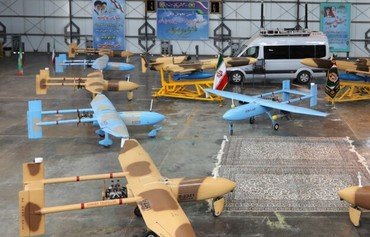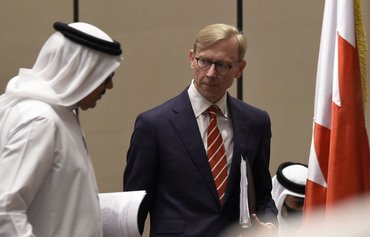Yemen's government on Monday (August 10th) urged the UN Security Council to extend its arms embargo on Iran as council members prepare to vote this week on a US resolution to extend it past October, when it is set to expire.
The embargo prohibits the sale, supply and transfer of weapons and materials used in military industries to Iran.
Information Minister Muammar al-Eryani, who issued the demand on behalf of the government, warned against lifting the arms embargo, saying it was necessary in order to curb Iran's destabilising policies and actions.
"Yemen, Iraq, Lebanon, Syria, the region and the whole world have for years paid a heavy price for the hostile policies [embraced by] the Iranian regime and Islamic Revolutionary Guard Corps (IRGC)," he said.
Since the Islamic Revolution of 1979, Iran has been attempting to export its revolution "and control other countries with the force of weapons and sectarian militias", al-Eryani added.
"Lifting the embargo will give the Iranian regime a free rein to spread chaos" across the region, he said, pointing out that the sale of arms will help it fund its subversive activities and threaten regional and global stability and security.
"It also will represent a severe blow to efforts to establish peace, as it will enable the flow of weapons to sectarian militias" including Yemen's Houthis (Ansarallah) and Lebanese Hizbullah, he said.
Political analysts have stressed the importance of extending the arms embargo on Iran to curb its destabilising activities and threats to international navigation.
"The Yemeni government's request to the Security Council to extend the Iran arms embargo is natural and logical," said political analyst Adel al-Shujaa.
"The continued flow of arms harms the entire region, threatens stability and prolongs the war in Yemen indefinitely," he told Al-Mashareq.
Iran supplied arms to the Houthis
"Iran's support to the Houthis, especially with weapons, has played the biggest role in prolonging the war and enabling the Houthis to launch their terrorist ballistic missile attacks on civilian facilities and civilians," al-Shujaa said.
The Houthis are in possession of new and sophisticated weapons, political analyst Faisal Ahmed told Al-Mashareq.
"It was Iran that supplied the Houthis with these sophisticated weapons, because it sponsors them and has an interest in enabling them to use such weapons in threatening the stability of regional competitors," he said.
The Houthis have attacked civilian and economic facilities in Saudi Arabia with ballistic missiles, Ahmed noted, and claimed responsibility for September attacks on Saudi oil facilities that had a negative impact on the global economy.
"The Houthis' attacks also targeted commercial vessels and the international navigation route in the Red Sea, which is a threat to the entire world and not just regional countries," he said.
"All of these attacks took place under the Iran arms embargo," he noted, predicting that "Iran will expand its destabilising activities if the arms embargo is lifted".
"Iran was able to continue to provide military and financial support to its proxies in Yemen, Lebanon, Iraq and Syria even under the arms embargo and economic sanctions," he said.
"But it will pose a much greater threat if the arms embargo is lifted, as its militias will be much stronger and influential, and this will threaten global security and stability," he added.

![Iranians visit a weaponry and military equipment exhibition in Tehran on February 2nd, 2019, organised on the occasion of the 40th anniversary of the Iranian revolution. [Atta Kenare/AFP]](/cnmi_am/images/2020/08/11/25456-Iran-missile-display-600_384.jpg)







Well, regardless of whether or not these sanctions are approved, the utilization of advanced fighters requires expertise in the first place. They [the Iranian government] have not been able to ensure the security of automobiles [manufactured] inside Iran since the 1970s; let alone using fighter aircraft. Well, Russia and China are not simply in love with Iran, to sell Iran their fighter jets, especially with Iran's current situation on the world stage... Russia is also an ally of Israel. That is, would it ever sell fighters which would threaten its ally? No! Finally, people still think that these international institutions and global organizations are really effective. It has been seen in the current corona virus pandemic how incompetent and World Health Organization was, and so was the United Nations. Iran has signed the human rights resolution, but it does not adhere [to it]. In a nutshell, these organizations are useless. The United States must act independently. It possesses the power and, in my opinion, it is better than all other countries.
Reply1 Comment(s)